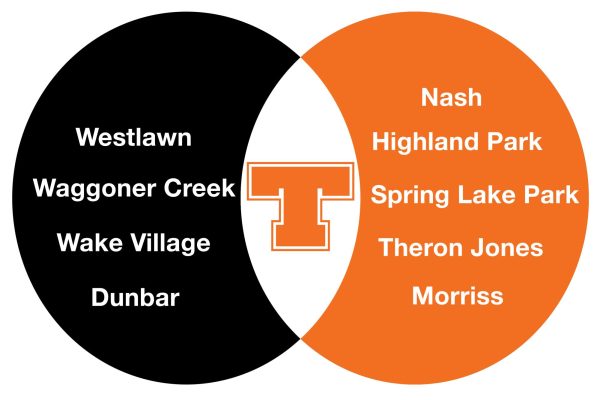That’s so old-school
10 reasons school should transition online, permanently
Senior Clara Smith sits at her dining room table working on her assignments. Texas High School transitioned to online education following the spread of COVID-19.
April 16, 2020
It’s true that looking up from your phone to discover you’ve just spent the entirety of another day in quarantine on social media or Netflix is no good feeling. But, if you all haven’t forgotten, spending an equally long amount of time in a class you have no interest in is just as soul-sucking.
You see, we’ve only been at this online school thing for a few weeks now; many of the downsides are problems that go away when a student hits their stride and finds a schedule that works for them. When this does happen, it becomes possible to see all the advantages of school from home, but just in case you needed them written out for you, here are 10 reasons why online school is a model that should be adopted even when things return to normal.
- Less time spent on the same volume of learning. While certain Zoom meetings can feel like they go on for hours, it’s no question that in the regular online school day nowhere near the seven and a half hour quota is spent on school work. Online school slims down the old-school school day to just a few hours by cutting out unnecessary time spent on transition periods, waiting for other students to finish, or (and what most students can attest as a shockingly regular occurrence) class periods where nothing is done.
- Material becomes easier when taken at your own pace. If somehow the years spent in our education have failed to make obvious, all students are different. This truth translates into the classroom. Topics that some students find easy, others find challenging. When online school is in session, lessons that students find especially hard can be rewatched or done at their preferred pace. Equally beneficial, topics that come as natural to some students won’t be drug out at a pace set for everyone.
- A healthy social life doesn’t have to be school-centric. Here is some tough news for everyone. If you have certain friends that you wouldn’t hang out with outside of school, they were never truly friends in the first place but, more so, acquaintances. Think about it; it’s likely some of your best friends aren’t ones that just happen to be in your Biology or History class. They are people you’ve known for years, perhaps out of a common interest or sport. It doesn’t take in-person schooling to maintain these kinds of relationships at all. It’s hard to see now, considering social distancing makes hanging out with friends an abstract idea, but true friendships don’t rely on school. They never did.
- Save enormous amounts of government spending. While this point may not be as groundbreaking as others made on this list, it’s certainly something to consider. According to the National Center for Education Statistics, the U.S. government spends on average $12,800 for every full time student enrolled in public education. A large portion of this could be directed elsewhere should schools move online, as there would no longer be a need for buildings, maintenance staff, and utilities. By redirecting this funding, each student could easily receive all of the technology they might need for online school, courtesy of the government.
- Online school provides technology skills. In our schools today, the way children are educated relies widely on worksheets, textbooks, and binders full of notes. But for what reason? The world this system is supposedly preparing them for has already moved online. Navigating technology every single day for online school prepares students for the modern workforce better than any single technology class. Online schooling develops valuable hands on experience with technology day in and day out, which is exactly what employers are looking for.
- Online school demands children develop the most valuable skill there is: personal accountability. In schools as we knew them, students were held responsible by teachers, administrators and parents. Online school is a different world in this way. When it’s just you and your education sitting a few feet away on a laptop without a teacher looking over your shoulder, the only person who can make sure that you will make an attempt to learn is yourself. I theorize that if we make online school a permanent reality, students everywhere would be forced to learn personal responsibility for their learning and take this valuable skill elsewhere throughout their lives.
- Take away time spent in school, and come away with a stronger family connection. I’m sure we’ve all seen this as the truth in these past weeks of quarantine, but when families are in close proximity to each other every day (as they are in the case of online school), they are able to bond. By making online school an everyday reality, rather than a temporary solution, we’d see this bonding and connecting happen everyday.
- Schools can still support children in need. One of the main arguments in defense of our school system is that schools can provide outreach, mainly nutritious food, to children that would otherwise go without it, but, as we’ve seen during the school shutdown due to COVID-19, schools will find ways to distribute food whether or not class is in session. For example, TISD has done a commendable job in the past weeks, offering, to every student, healthy lunches and breakfasts even amidst the time off, in the form of daily pickup.
- Sports and extracurriculars could, and would, survive. I am not suggesting that simply because classes should be moved online, that we should leave clubs and sports behind. In fact, I truly believe these programs that go beyond basic subjects and engage students in what they love are the best part of the traditional education system. These activities could still happen and likely would improve beyond their current state. Assuming only dedicated students would continue with these programs and those that select them only to fill their schedule would leave, we would see better plays and musicals, stronger athletic teams and more passionate clubs.
- Students ask for an extra hour of sleep, online school gives them that and more. I must admit, out of all the points made here, this is the one I appreciate the most. We often acknowledge that we are overextending students with crazy schedules that push them late into the hours of the night, leaving them with little time to sleep and mentally unwind. Online school, by relaxing these schedules, leaves students with ample time to benefit their physical and mental health, and just maybe, repair the damage to their internal clocks that years of school has caused.





















